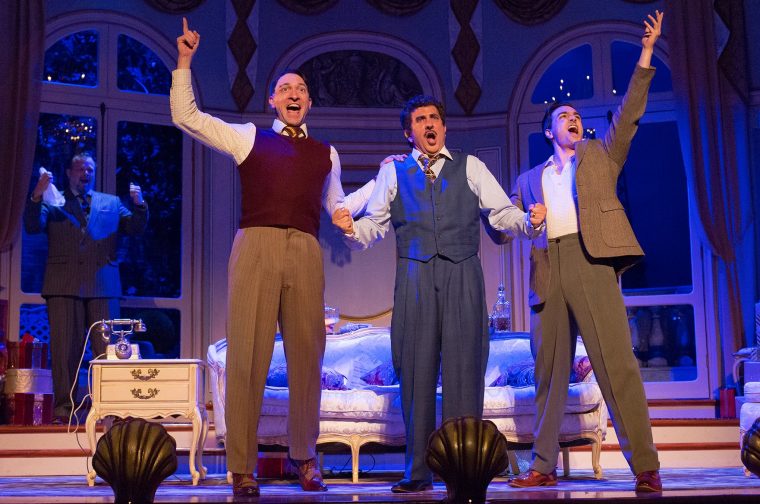
A Comedy of Tenors by Ken Ludwig. Walnut Street Theatre, Philadelphia, through March 3, 2019.
Ken Ludwig has a talent for writing farces that are extremely challenging for the actors. The action is athletic, over-the-top, and requires immense energy and skillful timing.
These challenges are successfully met in the production of Ludwig’s A Comedy of Tenors directed by Frank Ferrante at the Walnut Street Theatre. He’s enabled by a stellar cast that includes himself in the lead role as the temperamental tenor Tito Merelli. His co-stars include Scott Greer, Ben Dibble and Karen Peakes, longtime favorites of the Philadelphia theater community, plus Jacob Tischler, Alanna J. Smith and Dreya Weber.
Ludwig wrote this comedy in 2015 as a sequel to his popular Lend Me a Tenor from 1989. It is set in Paris in the 1930s, and references are made to the Swedish tenor of that era, Jussi Bjoerling. But the situation sounds more like a later time when Luciano Pavarotti, Placido Domingo and Jose Carreras appeared in a series of “The Three Tenors” concerts. Moreover, the character of Merelli seems to mirror Pavarotti.
In other words, Ludwig was using incidents of his own time when constructing the play.
A former mayor of Cleveland, Henry Saunders (Greer) is attempting to stage a “concert of the century” with three opera sensations, headlined by the egocentric Merelli. Plans are upset when Merelli finds his wife Maria (Peakes) in the arms of another man. He refuses to perform. The “other man” was Merelli’s younger rival Carlo Nunzi (Tischler) who actually is having an affair with Tito and Maria’s daughter Mimi (Alanna J. Smith), not with her mother.
To replace the recalcitrant Tito, Saunders hires the hotel’s bellboy Beppo, also played by Ferrante, who surprises everyone by revealing that he too has an operatic voice. Rounding out the trio of tenors is Saunders’s son-in-law and flunkie, amusingly played by Dibble.
The show abounds in slamming doors, mistaken identities, and rapid exits and re-entries. One of the highlights is the trio of men singing Libiamo, the drinking song from Verdi’s La Traviata which Pavarotti, Domingo & Carreras often performed together. Ferrante also cleverly creates opportunities for cast crack-ups and ad-libs, as he did when he directed and starred in the Walnut’s A Funny Thing Happened On the Way to the Forum.
Under Ferrante’s guidance, A Comedy of Tenors maintains a deliciously fast pace. David P. Gordon’s elegant hotel room set adds to the enjoyment of this crowd-pleasing production.